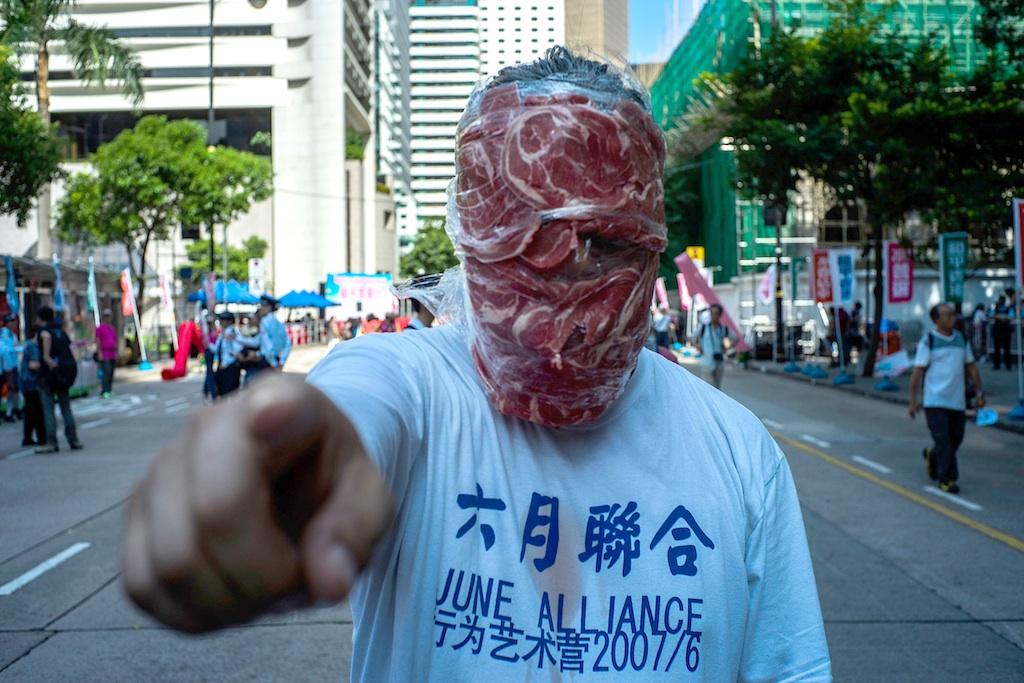Thousands in Hong Kong march against Occupy, in favor of mainland China
An anti-Chinese Communist party protester masked his face with raw meat during the march Sunday in Hong Kong.
HONG KONG — Tens of thousands gathered in sweltering heat in Hong Kong on Sunday to protest against a pro-democracy campaign that has threatened to shut down the city's financial district, exposing a deepening rift over political reforms in the former British colony.
The rise in tit-for-tat street protests between pro-Beijing and pro-democracy groups underscores the challenges China faces in shaping its vision for the political future of Hong Kong.
Backed largely by Beijing-friendly groups, the Alliance for Peace and Democracy says it "desires peace and no violence" and has denounced the pro-democracy Occupy Central movement that has said it will lock down the center of the city if Beijing does not allow truly democratic elections for a leader in 2017.
"We want to show that the march doesn't have to be violent and angry. It can be happy," said Robert Chow, a former Hong Kong radio host and spokesman for the alliance.
The group says it has so far collected close to 1.5 million signatures, including that of Hong Kong leader Leung Chun-ying, saying the "illegal" Occupy campaign would tarnish Hong Kong's reputation and hurt business.
It wasn't possible to independently verify the number, which exceeded the almost 800,000 votes in Occupy Central's unofficial poll on democracy in June.The anti-Occupy campaign kicked off early on Sunday with a run through the center of the city that attracted about 1,500 in temperatures as high as 30 degrees Celsius, organisers said.
The all-day rally, which marks the end of the alliance's month-long signature campaign, was overshadowed by speculation that some business groups had pressured people to take part.
One Chinese participant surnamed Chen, who is in her 60s, said some people attended simply because they like running.
"I bumped into a friend. She's running with colleagues from a property management firm. She said her firm encouraged her to run and she took part because she likes running," she added.
More people, mostly groups of elderly, showed up later in the morning to offer a flower "for peace", with different groups wearing the same colored T-shirts and hats.
Occupy Central has said its movement is peaceful, demanding a "genuine choice" for Hong Kong’s 5 million eligible voters.
After annual protests marking the anniversary of Hong Kong's handover to China last month, hundreds of police started removing protesters from the heart of Hong Kong's business district as they tried to stage a sit-in after a rally to demand greater democracy.
Elderly rally
"We do not support Occupy Central because it will bring trouble and instability to the city," said retiree Law Kwai-wing, 77, who said he had traveled across the border from China's Guangdong province as part of a bus tour organized by the pro-Beijing Federation of Trade Unions (FTU).
The group planned to stay for less than an hour before returning across the border from Hong Kong for lunch, which tour members would pay for themselves, he added.
Many rally participants, mostly elderly, told Reuters they had been provided with free transport by various political and business groups. In one district, about 150 people boarded buses organized by the Hong Kong Livestock Industry Association.
One man interviewed by Reuters said he had boarded a bus from an outlying area of Hong Kong and was given a HK$30 subsidy for lunch.
"It is normal to have a little bit of a subsidy when you are at a march. Some (marches) give more, some less, but this time we only get a little money for food," said Chan Chiu-fat, 55, who was wearing a straw hat.
In a Whatsapp message seen by Reuters, people were offered HK$350 ($45) to attend the rally "for five hours". The message sender, however, declined to provide their name or background.
Alliance spokesman Chow dismissed such messages as fake and attempts to discredit the campaign.
Debate has raged over the format of the election for Hong Kong's next leader in 2017. Pro-democracy groups have called on Beijing to allow open nominations rather than only letting "patriotic" pro-Beijing candidates to stand.Beijing has allowed Hong Kong – returned to Chinese rule in 1997 – to go ahead with a popular vote in 2017, the most far-reaching experiment in democracy in communist China.
Some analysts said the rally reflected Beijing's determination to curtail the momentum of Occupy Central through a formidable grassroots mobilization of supporters and the United Front Work Department – an organ of the Communist Party that works to propagate Party interests.
A group of pro-democracy lawmakers said they would press ahead with the campaign to gridlock Central, if Beijing fails to come up with a proposal that meets their demands.
Additional reporting by James Pomfret, Dancy Zhang and Venus Wu; Editing by Anne Marie Roantree and Michael Perry.
Every day, reporters and producers at The World are hard at work bringing you human-centered news from across the globe. But we can’t do it without you. We need your support to ensure we can continue this work for another year.
Make a gift today, and you’ll help us unlock a matching gift of $67,000!
